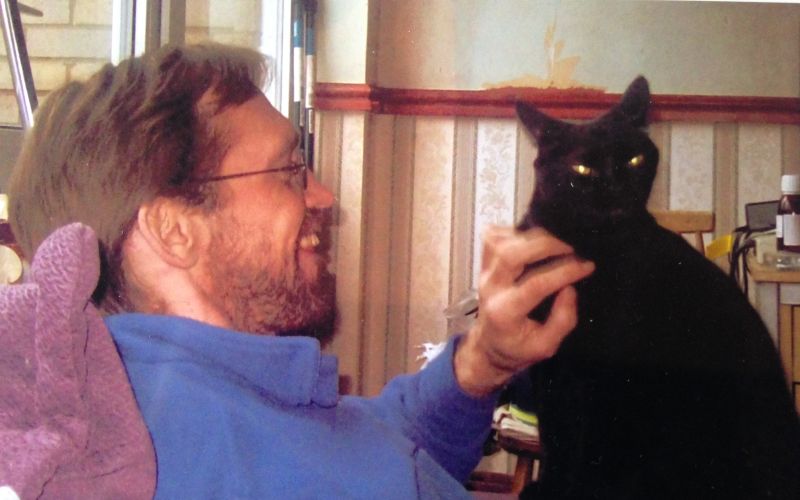The father of a man who took his own life after being found “fit for work” believes his son would still be alive if he had not been failed by the benefits system the government and its contractor, Atos.
Stephen Carre, 41, from Eaton Bray, Bedfordshire, died in January 2010, after the Department for Work and Pensions (DWP) confirmed its decision that he was ineligible for its new out-of-work benefit, employment and support allowance (ESA).
His father, Peter, said his son had suddenly stopped working in July 2007, and then lived off his savings for two years until his money ran out in 2009. His parents then paid his mortgage until he finally began claiming benefits in April 2009.
Stephen (pictured) had previously worked for the Civil Service and then various electronics and communications companies, including as a telecommunications consultant, with firms such as Cisco, Ericsson and Lucient, mainly on software installations which manage mobile phone charges.
After he quit his job, he rarely left his home, refused to talk to friends and relatives, or answer the door or telephone, and often spent days on end in the same room, surrounded by his possessions.
He finally began talking again to his father and step-mother, Frances, in early 2009, and in April 2009 they persuaded him to apply for ESA.
Peter said his son had struggled to cope with his anxiety and depression, although he had a girlfriend he saw occasionally.
He said: “He couldn’t go anywhere on his own for the first time. I had to go with him to his psychiatrist. He would only go to certain shops, and only on a certain day.”
Peter even had to accompany Stephen to the assessment centre two or three times before he was comfortable with the idea of attending his benefits eligibility test on his own.
ESA had been launched by the Labour government less than a year earlier, and concerns about the test, the work capability assessment (WCA), had not yet fully emerged.
At his assessment, a doctor employed by the government contractor Atos Healthcare decided that Stephen failed to match any of the criteria for eligibility and awarded him zero points, when he needed 15 to qualify for ESA.
The assessor concluded that there was “no evidence to suggest that the client’s health condition due to their depression, is uncontrolled, uncontrollable or life threatening”.
When that conclusion was rubber-stamped by a DWP decision-maker, Stephen asked DWP to reconsider the decision, as he believed it “disagrees wildly” with the opinion of his GP, his community psychiatric nurse and his psychiatrist.
On his appeal form, he wrote that the medical assessment “bears no relation to the medical I had”, and that the report was completed by the assessor eight days after the assessment took place.
He found out early in January 2010 that DWP had agreed with its earlier decision, so he was ineligible for ESA.
Although he began the next stage of the appeal process, he took his own life sometime in the next few days. His body was found on 18 January 2010.
Frances said she believes Stephen had made a sudden decision to kill himself, as he had recently been shopping and there was fresh food in his fridge.
Two months later, at his inquest, the coroner heard from Stephen’s GP and psychiatrist, who both said they had not been asked by the Atos assessor or DWP to provide details of his state of mental health.
The coroner, Tom Osborne, announced that he would write a Rule 43 report, a letter warning of a risk of future deaths if changes are not carried out by individuals or organisations.
In the letter, Tom Osborne said the evidence had shown that the “trigger” that led to Stephen’s decision to take his own life had been “the rejection of his appeal that he was not fit for work”.
He added: “I feel the decision not to seek medical advice from the claimant’s own GP or psychiatrist if they are suffering a mental illness should be reviewed.
“Both doctors who gave evidence before me confirmed that if they had been approached they would have been willing to provide a report of Mr Carre’s present condition and prognosis.”
DWP were told of Stephen’s death by his father, but they failed to inform the tribunal service, so when Peter Carre attended the appeal on his son’s behalf, he brought Stephen’s ashes with him.
Because of the inadequacy of the Atos assessment, the appeal had to be adjourned.
The following year, the tribunal ruled that Stephen should have been eligible for ESA and that the form completed by the Atos assessor was “not a sound basis” on which to turn down his ESA claim because of the eight-day delay between the assessment and the completion of the form, while there had been “no indication how much [of the form] was completed”.
The tribunal concluded that the Atos assessor’s report was “a suspect document”, because it did not appear to have dealt with the information provided by Stephen’s ESA50 claim form.
Later that month, the manager of Stephen’s local benefit delivery centre, in Luton, wrote to Peter Carre and said she agreed with the tribunal appeal that Stephen should have been eligible for ESA.
Peter wrote back, and told her there had been a “dismal failure” by both the benefits service and Atos and that he had attended Stephen’s tribunals on his behalf “to bring to notice the inept handling by the registered medical practitioner at Stephen’s medical review”.
Peter Carre told DNS that Atos, its assessor and DWP had all failed Stephen.
He said: “Anyone could have seen that Stephen was incapable of work. It is totally beyond me how they could have found him fit for work.
“If they had gone to his GP or his psychiatrist, I have no doubt the result of his assessment would have been different and he would probably still be with us today.”
In a written statement responding to questions from DNS, a DWP spokesman declined to comment when asked if ministers would apologise to the family of Stephen Carre.
He said: “Suicide is a tragic and complex issue and there are often many reasons why someone takes their life, so to link it to one event is misleading.
“Since this inquest took place under the previous government we have made significant improvements to the work capability assessment, including improving the process for people with mental health conditions.
“The percentage of people with mental health conditions who get the highest level of support has more than tripled since 2010, and we will continue to ensure that those who are able to work get all the help they need to move into a job when they are ready.”
He said improvements made since 2010 include “improving the opportunities people have to present medical evidence”.
The DWP spokesman said claimants were “encouraged to provide all evidence that will be relevant to their case at the outset of the claim, including medical evidence supplied by their GP or other medical professionals, while WCA assessors are “expected to seek further evidence in situations where it would help them to place someone in the support group without calling a claimant in for a face-to-face assessment”.
He said a DWP decision-maker will “assess all available evidence and seek more if required to reach their decision”.
But he admitted that DWP was still in discussions with Maximus – which took over the WCA contract from Atos earlier this year – to “pilot new evidence-seeking processes for claimants with mental health conditions”.
Atos refused to respond to requests for a comment.

 Call for public inquiry into deaths after coroner rules suicide was ‘triggered’ by DWP
Call for public inquiry into deaths after coroner rules suicide was ‘triggered’ by DWP DWP helped cause mental distress of poverty-stricken benefit claimant who took her own life, says coroner
DWP helped cause mental distress of poverty-stricken benefit claimant who took her own life, says coroner Cover-up allows DWP and other public bodies to avoid detailed probe into disabled woman’s death
Cover-up allows DWP and other public bodies to avoid detailed probe into disabled woman’s death